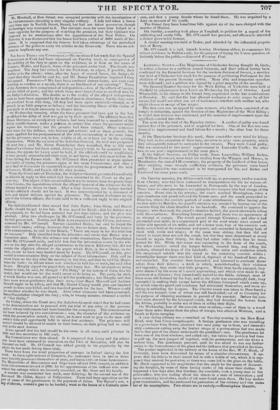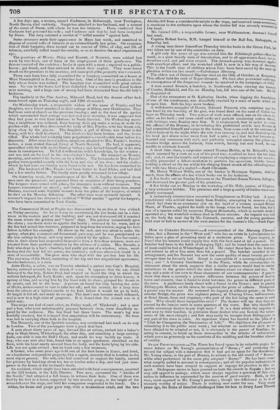On Tuesday morning, the Albion coach took up, as passengers,
twelve convicts from Chester, who had been sentenced to transportation for life for various offences, and who were to be forwarded to Portsmouth. by time way of London. There were no other passengers, excepting the two keepers who had charge of time convicts. About nine in the evening, the coach reached Birmingham, when a new coachman and guard relieved time former ones, and the coach proceeded to Elmedon, where the convicts partook of some refreshments. After having gone on four miles to Meriden, the eitard's attention was arrested by hearing one of the convicts tiling the chain attached to his handcuffs. He contrived to apprize the keeper; who (bent took the guard's situation behind, time guard afterwards riding with the coachman. Everything became quiet, and there was no appearance of an attempt at escape. The coach passed through Coventry ; and after it had proceeded nine miles, to a sequestered part of the road where trees extend on either side upwards of six miles, and not a house near, four of the convicts suddenly seized hold of the coachman and guard, and succeeded in fastening both of them with cords and straps; at the same time stating, that they did not intend to injure them nor rob the coach, but that they were determined at every hazard to regaiu their liberty, for they had rather suffer death than be transported for life. While thus scene was transacting in the front of the coach, five other convicts seized the keeper behind, secured him, and rifling his pockets, obtained the keys of the handcuffs. The noise and confusion which this occasioned outside was the signal to the remaining convicts within : instantlyithe keeper there was laid hold of, deprived of his handcuff keys also, and manacled. The convicts then descended, and laboured to extricate themselves from their fetters; a work in which, notwithstanding their violence and ingenuity, they made very little progress. While thus busily engaged, they were alarmed by the noise of a coach approaching, and which soon made its appearance at a distance : they immediately rushed to the fields, although most of them were still listened by the legs, and as the night was exceedingly dark, they succeeded in making their escape before the Alliance Liverpool coach came up, by which time time guard and coachman had extricated themselves, and were assisting in unbinding the keepers. The Chester coach was taken to Dunchurch ; and time two keepers (one of whom was still handcuffed) set off to Coventry for the purpose of obtaining assistance in pursuit of the convicts. Before the convicts were alarmed by the Liverpool coach, they had detached the horses front the Albion, probably to make use of them in aiding their flight.
On Wednesday, four of the convicts were re-taken,--one of them in a wood about three miles distant from the place of escape, two others at Wolston, and a fourth at Ryton turnpike.
A very daring robbery was committed on Tuesday evening in the New Kent Road, near New Cross turnpike-gate. A foreign gentleman who was travelling in a post-chaise frotn Dover, observed two men jump up in front, and immedi ately commence cutting away the leather straps of a portmanteau that was made fast to that part of the chaise underneath the postillion's seat. The gentleman let down one of the front windows, and called out; but before the post-boy had time to pull up, the men jumped off together, with the portmanteau, and ran down a narrow lane. The gentleman pursued, until he was afraid to run any further owitmg to the lonesomeness of the place and the darkness that prevailed at the time.
The parties implicated in the robbery at the house of the Rev. W. F. Hook, of Coventry, have been discovered by means of a singular circumstance. It ap
pears that the thieves in their search fell in with a bottle of ink, which it is supposed they mistook for port wine, as there was some left in the glass on the table. Mr. Hook suggested to the magistrates that this might be the means of discovering time burglars, by some of them having marks of ink about their clothes. It
happened a few days after, that Gardner, the constable, took a young man to the police-office, who was reeling about the streets in a state of intoxication ; and
upon examining his clothes, marks of ink were found upon them. He has undergone examination, and has confessed the particulars of the robbery and the num. ber of his accomplices. Two others are in custody.--43irmingham Gazette. A few days ago, a woman, named Cudmore, in Roborough, near Torrington, North Devon, died suddenly. Suspicion attached to her husband, and a woman of the name of Dunn, with whom he was too intimate. Dann confessed that Cudmore had poisoned his wife ; and Cudinure said that be had been instigated by Dunn. The Jury returned a verdict of "wilful murder "against both.
Some strangers made their appearance in Mayo last week, and contrived to dispose of several rolls tif tobacco at an extraordinarily low price. On examination of their bargains, these turned out to consist of 19Ibs. of clay, and lib. of tobacco, carefully rolled round the outside, so as to deceive the most experienced eye. The premises of Messrs. Blake and Everett, of Norwich, were rubbed last week by two boys, one of them in the employment of these gentlemen. The thieves carried off the cash-box ; broke it open with a stone ; repaired to a publichouse ; got drunk, and then returned to finish their exploit. They were found drunk on the premises in the morning, and some part of the property was recovered.
Three men have been fully committed for a burglary committed on a house at West Hanninglield in Essex, in October last. One of the men is grandson to the lady whose house was robbed. The burglary was committed with great adroitness. No one in the house had been disturbed, but a window was found broken next morning, and a large sum of money had been abstracted from the old lady's bedroom.
The landlady at the Blue Anchor, Mile-end Road, had the drawer of her bedroom forced open on Thursday night, and 1201. abstracted.
On Wednesday week, a respectable widow of the name of Franks, and her daughter, were found murdered in their cottage at Abbey, near Haddingtote They Lad been seen at church on the previous Sunday ; and as the door of the garden which surrounded their cottage was fastened next morning, it was supposed that they had gone to visit their relation,: in North Berwick. On Wednesday morning, a neighbour was induced, from hearing their pig make a noise, to scale the garden-wall ; and then discovered the body of Mrs. Franks, with her throat cut, lying close by the pigssty. The daughter, a girl of fifteen, was found in the house, with her skull fractured. The wiuduws had been broken, and the house rifled. The whole had evidently been perpetrated a considerable time before the discovery. After some investigation, suspicion attached to Mrs. Franks's brother in-law, a man named Emond, living at North Berwick. He had, it appeared, quarrelled with his wife on the Sunday before ; aol locked himself up in his own . room in consequence. Ile left it without his wife's knotsied,ge, by the window ; and was met on the road to his sister-in-law's house. He returned on Monday morning, and entered his bed-room by a ladder. The foot-marks in Mrs. Frank); garden corresponded exactly with the form and size of his shoe ; and the clothes which he had worn on Sunday were found to be wet, lie has been committed to jail. The husband of Mrs. Franks hail been butler to Lord EMI°, and had died but a few weeks before. The family were greatly esteemed in the village.
On Saturday week, the gamekeepers of Sir W. A. Ingilby discovered three men near the preserves. and pursued them on suspicion of their being poachers. The keepers were armed with pikes, the strangers, were without weapons. The keepers commenced au attack ; and during the scuffle, one young man, named Holmes, received some frightful wounds from the pikes of the keepers, of which he died on the Monday following. The other men were seriously injured. A coroner's inquest has returned a verdict of" Wilful murder" against the keepers, who have been committed to York Castle.



















 Previous page
Previous page